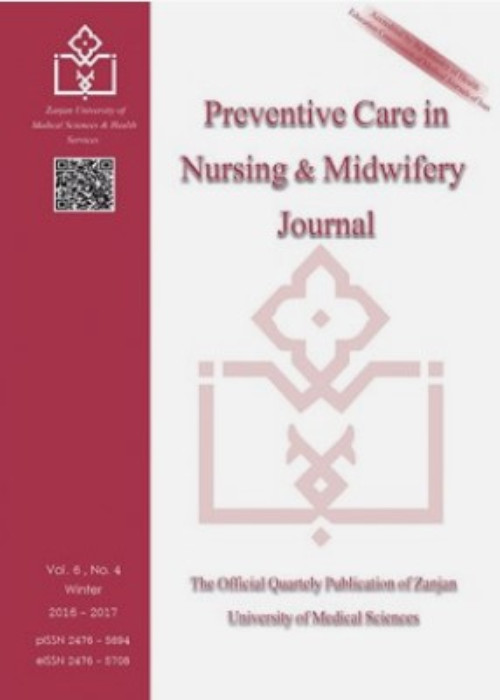Prevalence of unplanned pregnancy and factors related to maternal-fetal attachment in Zanjan, 2017
Author(s):
Abstract:
Background
Despite the progress of family planning programs, a significant proportion of pregnancies are still unplanned which threatens the different dimensions of community health. Unplanned pregnancy affects parent's-child association. Maternal-fetal attachment provides a model for the child's mental-social function at present and in the future.Objectives
This study was conducted to determine the prevalence of unplanned pregnancy and related factors of maternal-fetal attachment in pregnant women referring to Zanjan health centers in 2017.Methods
This descriptive correlational study was part of a clinical trial that was performed on 184 pregnant women who referred to health centers for routine prenatal care from October to February 2017 in Zanjan, Iran. Using multi-stage sampling method, health centers of Zanjan were divided into three categories based on social and economic situation. Then, from each category, three centers were selected, randomly. The inclusion criteria comprised being pregnant, satisfaction to participate in the study, have at least reading and writing skills, lack of the history of obstetric complications, psychological disease and medicine use, lack of known psychological disease, lack of narcotic substances abuse, and living in Zanjan City. Data collection tool included demographic checklists and maternal-fetal attachment questionnaire, which completed in self-report method. The data of this study were analyzed by appropriate statistical tests by SPSS v.16 software.Results
Among the participants 58.2% of women had planned pregnancy, 36.4% had unplanned pregnancy, and 5.4% had unwanted pregnancy. Maternal-fetal attachment scores were significantly higher in the planned pregnancy group 84(75-93) than the unplanned pregnancy group 57(54-60) and unwanted pregnancy group 56(48-64) (P˂0.001). The highest sub-scale in the planned pregnancy group was related to the attributing characteristics and intentions. Also, the most subscale in unplanned and unwanted pregnancies related to giving of self. There was a significant relationship between age, education, socioeconomic level, number of pregnancies, number of children and contraceptive method with type of pregnancy (P˂0.001).Conclusion
Based on the results of the study, it seems that reduction in unplanned pregnancy will enhance the maternal-fetal attachment and will improve the mother role and social-psychological health of the child.Keywords:
Language:
English
Published:
Preventive Care in Nursing & Midwifery Journal, Volume:8 Issue: 1, Spring 2018
Pages:
11 to 18
magiran.com/p2008873
دانلود و مطالعه متن این مقاله با یکی از روشهای زیر امکان پذیر است:
اشتراک شخصی
با عضویت و پرداخت آنلاین حق اشتراک یکساله به مبلغ 1,390,000ريال میتوانید 70 عنوان مطلب دانلود کنید!
اشتراک سازمانی
به کتابخانه دانشگاه یا محل کار خود پیشنهاد کنید تا اشتراک سازمانی این پایگاه را برای دسترسی نامحدود همه کاربران به متن مطالب تهیه نمایند!
توجه!
- حق عضویت دریافتی صرف حمایت از نشریات عضو و نگهداری، تکمیل و توسعه مگیران میشود.
- پرداخت حق اشتراک و دانلود مقالات اجازه بازنشر آن در سایر رسانههای چاپی و دیجیتال را به کاربر نمیدهد.
In order to view content subscription is required
Personal subscription
Subscribe magiran.com for 70 € euros via PayPal and download 70 articles during a year.
Organization subscription
Please contact us to subscribe your university or library for unlimited access!


